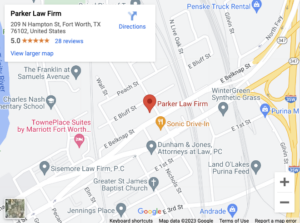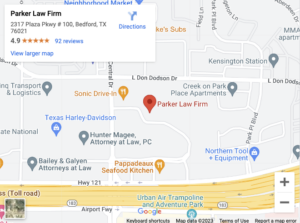
Most accidents and injuries that occur at work are handled through workers’ compensation. However, there are instances when a third-party lawsuit might be necessary to recover compensation for damages.
A third party is someone who is not directly involved in the workers’ compensation claim but who contributed to the cause of the worker’s injuries. Therefore, under Texas tort laws, the third party could be financially liable for the workers’ damages.
A third-party claim is a personal injury claim. Because Texas workers’ compensation laws do not limit the value of these claims, you could recover substantial damages.
The term third party also appears in other contexts within personal injury law, such as a third-party insurance claim after a car accident. It can also refer to certain types of parties involved in lawsuits (we’ll briefly discuss this latter circumstance below).
Filing a Third Party Claim in Fort Worth, TX

A third-party claim is a personal injury case. Typically, you begin by filing an insurance claim with the at-fault party’s insurance company if they have liability insurance that applies to your claim. You can also file a lawsuit against the third party seeking damages.
Third-party claims can arise from many situations. Examples of third-party claims include, but are not limited to:
- A negligent driver causes an accident while you are driving for your employer
- A property owner’s negligence causes you to be injured while on the job
- A defective tool or machinery causes your on-the-job injury
- A contract or subcontractor negligently causes your injury at work
You can file a third-party claim and a workers’ compensation claim for the same injury. However, you must prove fault to win a third-party claim.
Proving Fault for a Third Party Claim in Fort Worth, TX
Workers’ compensation is a no-fault system. You do not need to prove that your employer or another party caused your injury to receive workers’ comp benefits. You can contribute to the cause of your work injury and recover the same benefits as you would if the injury was not your fault.
However, third-party claims are subject to the same tort laws as other personal injury cases. You must prove that the other party caused your injuries and you sustained damages to recover compensation. You cannot recover damages if you cannot prove all required legal elements of your claim.
Additionally, if you are partially to blame for causing your injuries for a third-party claim, your compensation for damages could be reduced under contributory fault laws. The Texas proportionate responsibility statute states a claimant cannot recover damages if their percentage of fault is 51% or greater. However, if they are less than 51% to blame, their damages are reduced by their percentage of fault.
What Damages Can I Receive for a Fort Worth Third-Party Claim?
Unlike workers’ compensation benefits, third-party damages can compensate you for all economic damages. Workers’ comp only reimburses you for a portion of these losses. Additionally, you can receive compensation for pain and suffering (non-economic) damages.
Examples of the damages you can receive for a third-party claim include, but are not limited to:
- Your loss of income, including past and future lost wages and reductions in earning capacity
- The cost of medical treatment and rehabilitative therapies
- Emotional distress and mental anguish
- Out-of-pocket expenses, including personal care and household services
- Diminished quality of life and loss of enjoyment of life
- Scarring and disfigurement
- Permanent disabilities and impairments
As with other personal injury cases, the value of your damages depends on the facts of your situation. Your fault could negatively impact the amount of compensation you receive. However, sustaining catastrophic injuries and impairments could increase the value of your claim.
What Is the Deadline for Filing a Third-Party Claim in Texas?
The deadlines for filing personal injury lawsuits are set by law in Texas. The deadlines depend on the type of claim and other factors.
Most personal injury cases have a two-year statute of limitations, but there could be exceptions. Therefore, seeking legal advice as soon as possible is in your best interest to avoid missing your chance to file a third-party lawsuit.
Impleaders, Interpleaders, and Intervenors as Third Parties
Third-party can also refer to parties who may be added to the original lawsuit. We refer to these parties as interpleaders, impleaders, and intervenors.
An interpleader situation involves funds for an insurance policy. An insurance company files a lawsuit naming claimants who have claimed the policy funds. The insurance company is usually dismissed as a party, and the court decides the case between the claimants.
An impleader is someone the plaintiff or defendant brings into the lawsuit as a new party. For example, a defendant may add someone to the lawsuit they believe is liable or partly liable for the plaintiff’s damages. Likewise, if the defendant counter-sues the plaintiff, the plaintiff may add someone to the lawsuit the plaintiff believes is liable for the defendant’s claim.
An intervenor is a party who petitions the court to join a lawsuit. There are many reasons why a party might want to join a lawsuit. For example, the outcome of the lawsuit could impact the intervenor’s interests. The parties to the lawsuit could object or challenge the petition for intervention.
Contact a Fort Worth Personal Injury Lawyer for a Free Case Review
Third-party cases can be confusing. If you have questions or need help, contact a Fort Worth personal injury lawyer from Parker Law Firm Injury Lawyers during a free consultation at (817) 839-3143.


